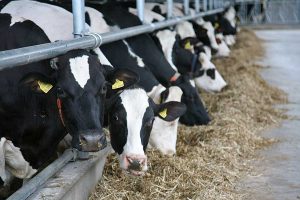News 056
News

European Milk Board / 17 May 2022
Alarming situation in the dairy sector
Exploding costs endanger food production: EMB calls for immediate action!
Press release / (Brussels/B) Cost increases in milk production are reaching alarming proportions and are threatening the survival of dairy farmers and thus milk production in Europe. Even though milk prices have seen a slight upward trend in recent months, these increases do nothing to compensate for the extreme rise in costs due to higher prices for inputs like fertilizers, feed and energy. But this price compensation is absolutely necessary, as the Executive Committee of the European Milk Board (EMB) clearly demands.
Massive price increases in Europe
- In Germany, the main dairies in North Rhine-Westphalia paid dairy farmers 44 cents per kilogramme of milk in February. While this was an increase in farm-gate price, it was far from enough to compensate for the cost increase of 10 cents (compared to accounting year 2020/2021) as calculated by the Chamber for Agriculture of North Rhine-Westphalia, which pegs total production costs at 53 cents/kg milk. In the words of the Chamber for Agriculture, “In this case, the calculated increase in costs entirely negates the increase in milk price.” And the costs incurred by producers continue to rise. For example, the price for the protein feedstuff rapeseed meal has already surpassed 500 euros per tonne in April.
- In Portugal, price increases of 62 per cent for diesel, 77 per cent for maize and 140 per cent for nitrogen fertilisers have been reported for April 2022 compared to April 2021.
- In Norway as well, fertiliser prices have increased sharply and have more than doubled compared to 2020. Electricity prices have, in fact, more than tripled in the last two years.
- In France, energy costs have increased by about 30 per cent and fertiliser costs have increased by over 80 per cent within the course of a year (comparison February 2021/2022).
- Incoming reports from countries like Italy and the Netherlands state that due to the explosion in feed prices, an increasing number of producers are forced to send their dairy cows to slaughter. A recent calculation for a sample farm with 200 dairy cows in the Italian Lombardy region discloses additional costs of about 13 cents per litre of milk compared to the previous year.
“This incredibly tense situation is currently forcing many farmers out of milk production and is eroding farming structures in the EU down to dangerous levels,” says EMB President Sieta van Keimpema. According to EMB Executive Committee member Elmar Hannen, immediate action must be taken to counteract this threatening development: “Further, massive losses in number of farmers is the worst thing that can happen to us in Europe. It will be impossible to recover from this. This rapid withering down of the sector will undoubtedly lead to difficulties in food production in Europe.”
He goes on to say that an agricultural sector without viable farms, an agricultural sector that is essentially highly industrialised, will be in no position to develop in the desired environmentally-friendly direction. Therefore, the EMB calls on all decision-makers to take immediate action.
What needs to happen NOW for stable and sustainable milk production?
- Exploding production costs must be passed on and thus covered by prices.
The EMB explicitly appeals to purchasers and processors to play their part in dealing with increased costs when it comes to milk.
- Social sustainability in the CAP and the Green Deal must be immediately anchored and implemented.
Without viable farms, there can be no food sovereignty nor a successful transition toward environmental sustainability. Therefore, the EU must make social sustainability an urgent priority in its strategies and regulations.
- The market must contribute to the transformation of the agricultural sector.
The objective must be prices that offer full cost coverage – including all sustainability costs. To make this possible, the market must contribute to the sustainability transformation in the agricultural sector. Policy-makers need to set up the necessary tools for the same. If we were to continue with business as usual, it will be impossible to put the brakes on the steady decline in number of farmers and this trend will only be further accelerated.
- Horizontal producer organisations must be permanently and effectively established.
Producer organisations that negotiate contracts and prices with processors on behalf of farmers must be established across dairies and throughout the EU with sufficient negotiating power. As Boris Gondouin, EMB Executive Committee member from France, explains, the only option is producer organisations with a real horizontal structure that are not tied to a single dairy. “They will have the necessary market power to negotiate with processors on an equal footing only if they can negotiate with multiple dairies at the same time.” He continues that it is absolutely essential for farmers from cooperatives to be represented in these producer organisations. “Many farmers are members of cooperatives, which means that they cover a large portion of the milk volume. Cost-covering prices have to be negotiated for these deliveries as well,” says Gondouin.
- Mirror measures must apply to imported agricultural products
The EMB is in favour of imported agricultural products being subject to mirror measures (health and environmental standards), so that agricultural products that do not comply with EU standards are not placed on the EU market. The objective is to ensure that consumers in the EU are always afforded the same level of health and environmental protection. Furthermore, this would also prevent local EU products, which are more expensive to produce due to local standards, from being marginalised and replaced by ‘cheap’ imports. This would simply lead to displacement of production and thus emissions outside the EU. It would be contrary to the desired global environmental improvements in the agricultural sector.
further information: European Milck Board (EMB), www.europeanmilkboard.org